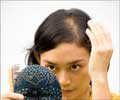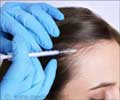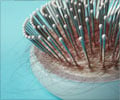Medicines For Women’s Hair Replacement
Medicines for hair loss should ideally be a woman’s first line of treatment for balding. The earlier you start treatment with medicines for your hair loss, the better the results. Medicines for hair loss work best when you start them at the stage of thinning rather than after you are bald.
Proven drugs to treat hair loss have been available since 1988, when minoxidil was approved by the FDA for treatment of hair loss. Finasteride, the other main drug for hair loss, received approval used to treat hair loss in 1997. Both of them were ‘discovered’ accidentally, when during their trials (for treating high blood pressure and prostate enlargement respectively) researchers noticed the unexpected side effect that they had in the subjects: hair growth.
Finasteride, unfortunately, is not meant for women. This anti-androgen drug works by preventing testosterone from turning into dihydrotestosterone or DHA, the hormone that acts on hair follicles to slowly kill them, and it can cause deformities in male fetuses if a woman is pregnant. To be safe, doctors advice that a pregnant woman should not even touch finasteride. Dutasteride, which is similar to finasteride, should also not be used by women.
For women, here are the main medicines used to treat hair loss, and a few that you need to know may trigger hair loss if you are susceptible:-
- Minoxidil
- Other topical medicines like azelaic acid and saw palmetto
- Oral medicines
- Medicines that can cause hair loss
Minoxidil
Minoxidil is a ‘topical’ medicine for hair loss, which means it is applied as a cream or lotion to the scalp. A vasodilator, minoxidil causes blood vessels to dilate or expand. Though scientists don’t yet know for certain what makes minoxidil work, they suspect it’s because the expansion of blood vessels in the scalp causes the follicles to be stimulated and better nourished.
Minoxidil works best for genetic hair loss, so your doctor needs to make sure that nothing else (stress, diseases, hormonal imbalances, other medicines) is causing your hair loss before he prescribes this for you. It also works best in the center areas of the scalp, where most men and some women tend to have the heaviest loss. The initial studies reported that after 32 weeks of treatment with a 2% minoxidil treatment, 63% of women had at least mild regrowth of hair.
You can get the 2% minoxidil solution over the counter, but higher-concentration solutions need a doctor’s prescription. The higher concentrations sometimes lead to more hair growth, but they also carry more risk of irritating the scalp and causing hair loss in unwanted areas like the face. The 2% minoxidil solution, combined with other topical medicines (described below) or with oral medicines work fine for most women.
The good news is that minoxidil, when it works, seems to have a more permanent effect on women than on men. For men, the new growth often disappears when they stop minoxidil. Many women, on the other hand, find their new hair continues to grow even after they stop taking minoxidil.
Other Topical Medicines
Other topical medicines are sometimes combined with minoxidil to increase its effectiveness. Here are the most frequently used among them:
Azelaic acid, a mild acid found naturally in wheat, reduces the growth of bacteria, stimulates cell growth, and reduces inflammation. It is applied on the scalp like minoxidil and sometimes is included in minoxidil solutions. Because exposure to sunlight seems to make it less effective, many people apply azelaic acid overnight and apply minoxidil in the daytime. Medroxyprogesterone seems to improve absorption of minoxidil and is also sometimes included in minoxidil solutions.
Spironolactone and saw palmetto are also used as topical applications for their anti-androgen properties. They promote hair growth by blocking the formation of DHT. Saw palmetto extracts are sometimes also used in oral medicines that claim to contain vitamins that promote hair growth, but none of these ‘hair vitamins’ have been proven yet. Tretinoin, a form of vitamin A, exfoliates the scalp and seems to stimulate hair growth by helping skin absorb more minoxidil.
Ketoconazole, the effective ingredient in Nizoral, treats fungal infections of the scalp that cause hair fall. If your hair fall is due to a fungal infection, your doctor will prescribe ketoconazole-containing topical products.
Oral Medicines for Women with Hair Loss
There are also ‘oral’ medicines (taken through the mouth) to treat hair loss in women. All these are off-label, which means they have not been approved by the FDA for treating hair loss, though they have been approved for treating other conditions.
Estrogen and progesterone are the ‘female’ hormones that help hair grow and stay on the head longer – they are what cause pregnant women to have thicker hair. Estrogen-deficiency hair loss can start around menopause and be treated with hormone replacement therapy. Low androgen index birth pills, which decrease the production of ovarian androgen, have also been used to treat hair loss in women.
Oral spironolactone is also sometimes used to treat hair loss, though it does not work with alopecia areata or non-genetic causes of baldness. Cimetidine (antihistamine) and cyproterone acetate (anti-androgen) seem to help control hair loss in high doses in women, but men should not take cimetidine because it has feminizing effects.
Drugs Women Should Avoid
There are many drugs that can cause hair fall in women, besides chemotherapy and radiation drugs (which make many women go bald).
Women with hair loss or a family history of hair loss should be careful when taking birth-control pills because many of them can trigger hair loss. Some women seem to be more susceptible than others to this kind of hair loss, and sometimes the loss happens immediately after they stop taking the pill. Implants, injections, skin patches and vaginal rings for birth control can also cause hair loss because all of them affect your hormones. If you have fine hair or your hair is falling, you should ask for low-androgen index pills for birth control.
The list of other medicines which can cause women to lose hair as a side effect is long: drugs for acne, anticoagulants, drugs for weight loss and attention-deficit, antidepressants, antifungals, and beta-blockers for high blood pressure, among others. If you have severe hair fall, you need to check with your doctor about whether your drug is causing it.
Women with alopecia areata, or bald patches on the head, sometimes grow hair after receiving steroid injections in the bald spot. If the spot is small and there are only a few spots, this treatment can work, though it is painful and many injections over days are needed to make hair grow.
Some people report good effects with the laser comb. Though the laser comb has been cleared by the FDA for safety, its efficacy is still debated.








